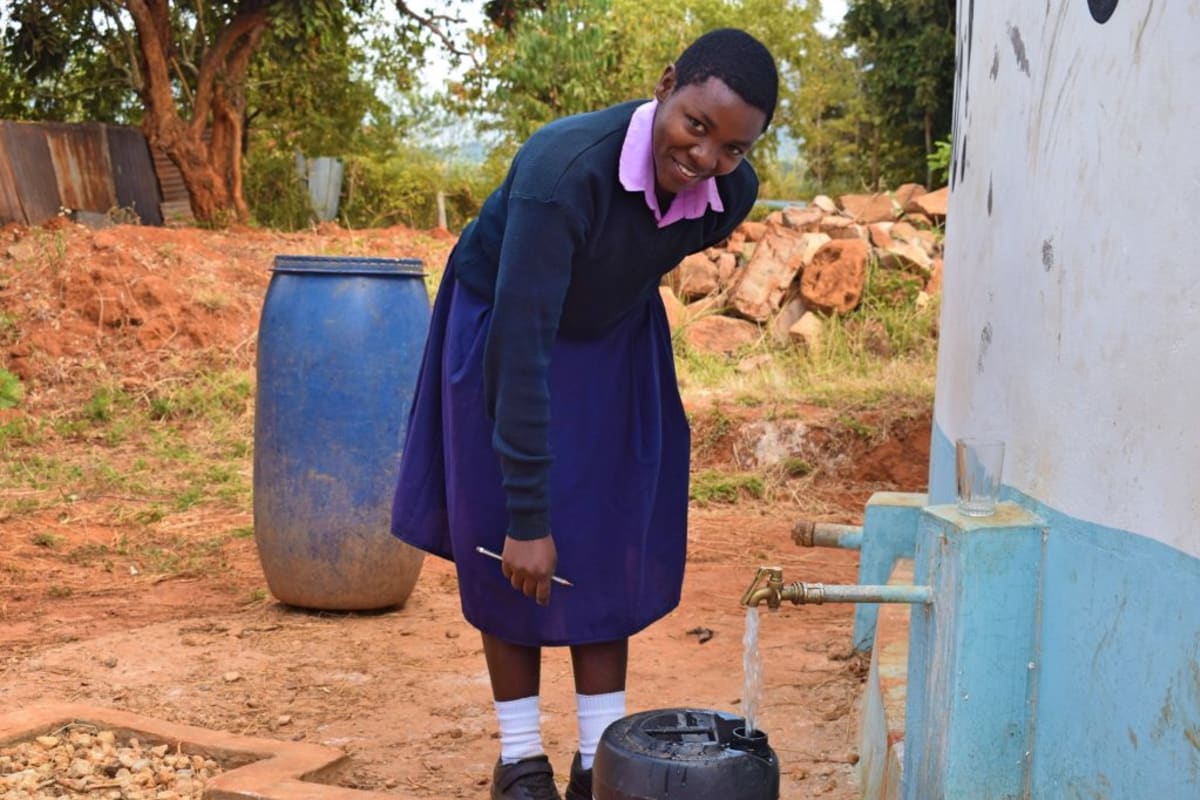Utuneni Secondary School was started in 1987 as an initiative by local parents who wanted a school in their locality to help their children, who were traveling long distances to access an education. The primary school donated the secondary school's initial classrooms, and it has since seen continued growth through support from the parents, federal government, and the Mbooni Constituency Development Fund.
A total of 263 students are enrolled at the school today. The school sits on a shared compound with the primary school section, and the compound has significant tree coverage made of modern tree species. An average day at the school starts at 6:30 am with the morning preps and ends at 5:30 pm after games.
The main source of water is piped water from a community spring into the schoolyard. The water is highly rationed since it is shared with the rest of the community. As a result, the school is only allocated water access two days per week. And that is if the system is functioning.
"It has been unreliable with regular breakdowns of pipes while also not providing enough water to cater for all our needs because it is rationed to serve the community population and us. This has affected the school's growth as top students and teachers would not want to be in a school without enough water," said Principal Isaac Komoni.
To fill the gap, the school purchases water from vendors. This leaves the school with high bills and in dire need of water.
The boarding students are only provided with 5 liters of water per day for all their water needs, compromising their hygiene and sanitation standards as the water is not enough to meet all of their needs. That is just one-quarter of the United Nations recommendation that people need at least 20 liters of water per day to meet their basic needs.
The school facilities such as latrines and classes are only cleaned once per week due to the water challenges. This creates an unfavorable learning environment for the students and staff.
"School life has been full of water-related challenges. We are only provided with 5 liters of water per day to cater to our daily needs, including bathing and washing clothes. The school latrines and classes are only cleaned once because water is not always available. Sometimes, the classrooms are dusty, but we have to learn in them because there are no other options," said student Zipporah M.
Rain Tank
We will build a 104,000-liter rain tank for this school, making the others look tiny in comparison. Because of how rarely it rains in Southeastern Kenya, this tank's large volume is designed to store as much water as possible during the seasonal rains, making more water available through the dry months. This water will benefit the students, teachers, and additional staff.
Parents will mobilize the materials needed for construction, including sand, stones, and water. They will also lend their strength and time to help with the construction. We will complement their materials with a skilled artisan to lead the project and provide the tools, lumber, metal, cement, and gutter system.
As soon as the tank has time to cure, it can begin collecting rainwater for the school's use.
Training
We will train students and staff on sanitation, hygiene, and other topics for one day. Those in attendance will form a school health club that will promote good hygiene and sanitation practices at school and home. They will learn all of the steps to proper handwashing, how to treat water, and how to keep their environment clean. The school will also be taught how to oversee best and maintain their new rain tank and handwashing stations.
Handwashing Stations
A total of 3 handwashing stations will be installed upon the project’s completion and before training. These are 1,000-liter plastic tanks fitted with three taps each, allowing nine students to wash their hands at once. The student health club and school management will be responsible for making sure the tanks are filled with water and that a cleaning agent such as soap or ash is always available.

 Rainwater Catchment
Rainwater Catchment
 Rehabilitation Project
Rehabilitation Project


































